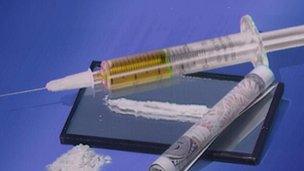Decriminalise heroin and cocaine says Belfast drugs worker
- Published

One of Northern Ireland's most senior drugs workers has said that class A drugs like heroin should be decriminalised, regulated and made available on prescription.
Michael Foley is the head of the Belfast Trust's Drug Outreach Team and has two decades of experience working with drug addicts.
"I think the impact of decriminalising, of regulating, of taking this activity out of the hands of organised crime, is the way to improve our society right now," he said.
His comments are part of a BBC Radio Ulster documentary on heroin use in Belfast.
The BBC was given access to the Drug Outreach Team (DOT), the only statutory team of its kind in Northern Ireland.
It has only five staff, but works with about 100 long-term heroin addicts in greater Belfast, as well as others addicted to drugs like cocaine or prescription drugs.
The team tries to reduce the harm addicts do to themselves and others, encouraging them to use clean needles, inject safely, control their drug use or use heroin-substitute drugs like Methadone.
Black economy
Possession of drugs is a criminal offence, but Mr Foley said prosecuting people for using drugs was a "negative, non-productive action".
"It's driving drug supply into the arms of people who are unscrupulous and the lack of regulation means people are dying as a result of this black economy," he said.
"Giving us the opportunity to give people pure drugs or regulated drugs would be a far more rational approach than trying to criminalise the vast majority of people that we end up working with."
Legislation on illegal drugs in Northern Ireland is under the control of the UK government.
In December 2012, Prime Minister David Cameron ruled out the idea of a royal commission to consider decriminalising illegal drugs, which had been suggested by a group of MPs.
£80 a day habit
A number of heroin addicts also spoke candidly to the BBC about their dependence on the drug.
John - not his real name - spends around £80 a day on heroin and said that it is as easy to buy in Belfast as "a cup of tea in a cafe".
"You can get it anywhere. I can make a call and get it in 15 minutes."
Jake - not his real name - sells drugs to fund his own heroin habit.
"I'm not a pusher, I'm a service provider," he claimed. "I sell drugs to get that money, I do not rob grannies. I would maybe sell a bit of cannabis to get a bit of heroin."
A number of people also spoke about their experience of overdosing on drugs.
Jo is a former addict who now helps DOT work with other drug users. She said that addicts are often afraid to call the emergency services if they or others with them overdose.
"That was the deal we had - police weren't called to the house," she said.
"If somebody went over, you'd put them out in a building, phone an ambulance, but nobody would be there with you, so many times I woke up in strange places overdosing on drugs."
Mr Foley said that, although it is not their initial focus, "hopefully what we do is allowing people pathways into a different lifestyle".
When the Drugs Don't Work is broadcast on BBC Radio Ulster and BBC Radio Foyle at 13:30 GMT on Sunday 17 February 2013 and again at 19:30 on Thursday 21 February 2013.
- Published5 February 2013
- Published6 September 2012
- Published30 August 2012